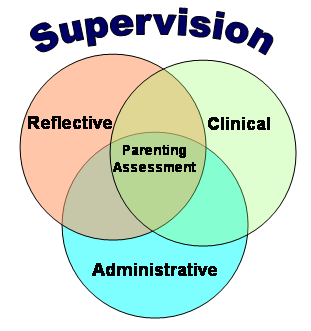
Supervision: Key to Making Parenting Assessment Matter to Children
Everyone who assesses parenting has the ultimate aim of helping children develop to be healthy and well-adjusted. More than a decade of experience with assessing parenting has taught us that quality supervision is key to the successful implementation of a parenting assessment. Just as supervision is seen as key to the delivery of high-quality family services (for more see, Putting Reflective Supervision into Practice (November 2010). Journal of Zero to Three Vol. 31 (2), S. Scott Heller and L. Gilkerson, A Practical Guide to Reflective Supervision (2009). Zero to Three, and R. Parkalani and N. L. Seibel (2001). Being in Charge: Reflective Leadership in Infant/Family Programs, Zero to Three – all available at the Zero to Three Bookstore).
There are many ways to think about supervision. One useful way is to envision supervision in terms of three overlapping aspects: Reflective, Administrative, and Clinical. To effectively serve the family, parenting assessment needs to be addressed within all three aspects. The most effective supervisors move skillfully among all three aspects as they watch, listen, wonder, and guide their staff during individual and/or group sessions.

Reflective Supervision and Parenting Assessment
Recently, Reflective Supervision has received much attention (See Zero to Three references above for good sources on this topic and also Three Building Blocks of Reflective Supervision). Working with families in need is emotionally challenging work. Reflective supervision creates a safe place for the service provider to manage her emotions and thoughts concerning her work with families. Even planning to conduct a parenting assessment can bring up emotions. For example, the service provider may be concerned about being judgmental. We need to recognize that service providers are invested in the success of their families. When asked to give an accurate and honest assessment to a parent, the provider may be concerned about damaging her relationship with the family. Reflective supervision can help the service provider see that a parenting assessment can offer a different perspective for the parent to consider, which includes both strengths and opportunities for improvement. To facilitate this process, the Keys to Interactive Parenting Scale (KIPS) phrases its 12 items as questions, and includes a section that guides reflection. After the parenting assessment has been conducted, reflective supervision is important in working through any emotions that emerge from the experience. When service providers step back for observational assessments, they may see things they don’t notice in their usual interactions with the family. As we describe in the KIPS training, prior to conducting an observational assessment, service providers may develop what we call the horns or halo syndrome. Sometimes as result of conducting a structured observational parenting assessment, the service provider is disappointed because the parent’s halo becomes tarnished. By observing he learns that a parent, for whom his gut feel was very high, actually has much room for improvement in several specific parenting skills. Alternatively, the service provider’s observation of a parent, for whom the gut feel was low, may reveal unexpected strengths during interactions with her child. Working through such emotions with a supervisor is important in coming to a clear and balanced parenting assessment to open a conversation with the family about what best serves their needs and preferences.
Administrative Supervision and Parenting Assessment
For the Administrative Aspect of Supervision each agency needs to adhere to policies and procedures. For parenting assessment, this means seeing that the family is fully informed of its use and value during the intake process. Administrative supervision includes guiding the service provider in parenting assessment training, maintaining certification, scoring reliability and sharing results with families. Also under administrative supervision is ensuring that the parenting assessments are administered on schedule, scored and entered into the program’s data system. With all that family service programs ask of service providers, this is more challenging than it seems, and effective administrative supervision can be the key to success.
Clinical Supervision and Parenting Assessment
The Clinical Aspect of Supervision is where the value for the parent and child comes into play. With insights gained from a parenting assessment, the service provider and supervisor can explore the best means of supporting growth in the parent (see Comfort et al. (March, 2010). Keys to Interactive Parenting Scale: KIPS Shows How Parents Grow. Journal of Zero to Three, Vol. 30(4), 33-39.) What strengths will we reinforce? What opportunities are there for improvement? Knowing what we know about each parent, child and family, their history and their current circumstances, what is the best approach? What resources would best fit each family’s culture, interests and abilities? The first dozen or so posts to the KIPS Cradle Blog were on how to effectively provide feedback to families; and it is in clinical supervision where these concepts can be used in planning.
If the parenting assessment was timely and reliable (thanks to Administrative Supervision), and the service provider is emotionally clear and thinking objectively (thanks to Reflective Supervision), then high quality service planning and delivery becomes possible (thanks to Clinical Supervision). It is this thoughtful, high quality intervention, supported by strong and rich supervision that improves parenting quality, which in turn results in optimal child development. After all, promoting healthy, well-adjusted children is our common aim.
